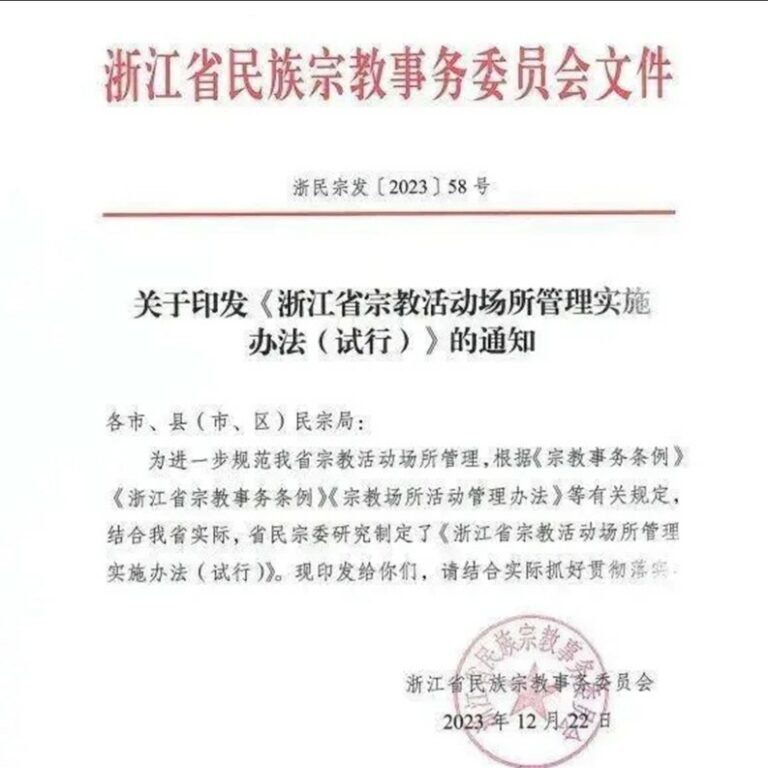(Hangzhou, Zhejiang Province – February 13, 2024) The Ethnic and Religious Affairs Committee of Zhejiang province has officially launched the “Implementation Measures for the Management of Venues for Religious Activities (Trial Implementation).” The official statement claims that the aim is to standardize the supervision of religious activity venues in the province. Ethnic and religious affairs bureaus of cities and counties have notified and issued the document to the next level of governance, township government, and sub-district offices. Implementation of the Measures took effect on February 1, 2024.
The document was formulated and issued by the National Religious Affairs Administration in July 2023. It outlines institutional requirements regarding the approval and registration of religious activity venues, personnel management, and the standardization of religious activities. The development of this document is reportedly based on eight statutes including the Constitution, laws, and relevant regulations on religious affairs and the administrative measures for religious personnel.
According to the official website of the Zhejiang Ethnic and Religious Affairs Bureau, the Measures consist of ten chapters and eighty detailed provisions.
The third article of the first chapter of the Measures carries strong political colors, requiring religious activity venues to “uphold the leadership of the Communist Party of China, uphold the socialist system.” It also introduces politically charged guidelines on personal worship, advocating for the “thorough implementation of Xi Jinping Thought on Socialism with Chinese Characteristics for a New Era” and the “practice of core socialist values, adhering to the direction of developing religion in the Chinese context in our country.”
The eighth article of the second chapter of the Measures provides strict regulations on the conditions for establishing religious activity venues, the required materials for submission, and the review procedures. One of the mandatory conditions is the presence of “religious personnel” who conduct religious activities or individuals who have “met” the provisions, regulations, and laws stipulated by the religious organizations of the country.
Under this provision, official authorities supervising religious affairs may exclude house churches and preachers who are not officially recognized as such from the “fulfillment of conditions” they require. Any preachers who have not obtained an official “religious personnel certificate” will be deemed “falling short of the qualifications” for establishing religious activity venues.
The fifth chapter of the document places restrictions on the organization managing the religious activity venues. Article 33 states that “upon the expiration of the term, a change of term should be conducted under the guidance of the local religious groups,” and any early or delayed change of term must be reported to the department managing registration to fill records. The creation, adjustment, and punishment of the organization managing the matter all require “soliciting the opinions of the local religious groups.”
These religious groups likely refer to organizations managing religious affairs in a semi-official capacity controlled by official religious authorities. The personnel arrangements of the organizations managing the religious activity venues effectively lie in the hands of the Religious Affairs Bureau.
Article 35 states that members of the organization managing the religious activity venues should “uphold the leadership of the Communist Party of China and the socialist system” and should be mainland residents with Chinese nationality.
Article 36 states that the Religious Affairs Bureau can order the replacement of any member of the management organization who is deemed “incompetent” or “fails to fulfill duties as prescribed” by the Religious Affairs Bureau.
The final determination and replacement are ultimately decided by the Religious Affairs Bureau.
Article 39 of the sixth chapter states that the personnel working at and activities held in the religious activity venues are under the control of the Religious Affairs Bureau. The document specifies that religious activity venues “should, in accordance with the relevant provisions of the ‘Measures of Administration for the Management of Religious Personnel,’ promptly handle the filing of records or cancellation procedures for religious personnel taking or leaving office.” The provision encourages and stipulates that personnel of religious activity venues participate in educational training organized by official religious groups, religious schools, and relevant departments.
Article 41 essentially prohibits activities outside the approved religious activity venues. The relevant provision states, “It is not allowed to organize or conduct religious activities outside this venue without permission.” Unless approved in advance by the relevant government department and obtaining approval from the relevant government department.
The document states that the religious activity venues should “accept the guidance, supervision, and inspection of local relevant departments.”
Article 79 of the ninth chapter states that the Ethnic and Religious Affairs Committee of Zhejiang Province, as the formulating department, is responsible for interpreting this document.
It is expected that the Chinese Communist Party will begin implementing this document in early February this year, even though the formulation of these Measures contradicts the religious freedom guaranteed by the Chinese Constitution.
This “Implementation Measures for the Management of Venues for Religious Activities of Zhejiang Province” will also correspond with the “Patriotic Education Law,” which came into effect on New Year’s Day in 2024. Article 22 of the “Patriotic Education Law” stipulates: “The state encourages and supports religious groups, religious schools, and religious activity venues to carry out patriotic education, enhance the national awareness, civic awareness, legal awareness, and patriotic sentiments of religious personnel and believers, and guide religion to be compatible with socialist society.”
The series of diverse and gradually introduced regulations and provisions, combined with the administrative pressure exerted by the Chinese government on religious beliefs, weigh heavily on religious groups and believers in China. Instead of strengthening the constitutional right to religious freedom for Chinese citizens, it represents comprehensive constraints. Without genuine freedom of religious expression, it becomes a suffocating form of pseudo-freedom.

